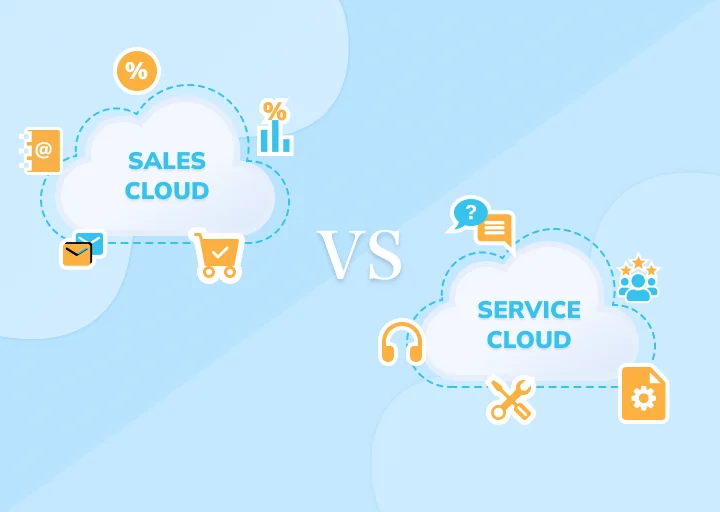When considering Salesforce for your business, it’s crucial to understand the distinct functions and features of its two primary platforms: Sales Cloud and Service Cloud. Both are built on the Salesforce Platform but cater to different business needs.
Sales Cloud is designed for sales teams, focusing on acquiring accounts, navigating the sales funnel, and closing deals. It offers specialized features for sales representatives and managers.
Service Cloud, on the other hand, is aimed at service agents and managers. It emphasizes improving agent efficiency, enhancing customer experiences, and managing customer service issues in line with company procedures and service level agreements (SLAs).
Table of Contents:

Shared Features:
Both platforms offer essential Salesforce functionalities, crucial across various industries:
- Accounts and Contacts Management: Central to both sales and service, this feature allows efficient management of customer accounts and contacts.
- Basic Case Management: Included in Sales Cloud, this feature helps sales teams track support issues and maintain customer satisfaction.
Distinct Features of Sales Cloud:
- Lead Management: Tools for capturing and nurturing leads, automating follow-ups, and moving potential customers through the sales process.
- Opportunity Management and Forecasting: Tools for managing sales opportunities and forecasting future sales, aiding in quota and projection management.
Distinct Features of Service Cloud:
- Robust Case Management: Advanced tools for managing customer cases, with features like Auto-Response Emails and Assignment Rules.
- Diverse Customer Support Channels: Offers multiple channels for customer support, including email, chat, and SMS, with Omni-Channel and Service Cloud Voice for a unified support experience.
- Self-Service Options: Includes features like Lightning Knowledge and Einstein Bots, allowing customers to find answers independently and reducing the workload for service agents.
Summary
Understanding the differences between Sales Cloud and Service Cloud is vital for effectively using Salesforce in your business. While sharing foundational features, Sales Cloud is optimized for sales activities, and Service Cloud is tailored for customer service excellence. This insight is key to making informed choices about Salesforce’s offerings for your business needs.